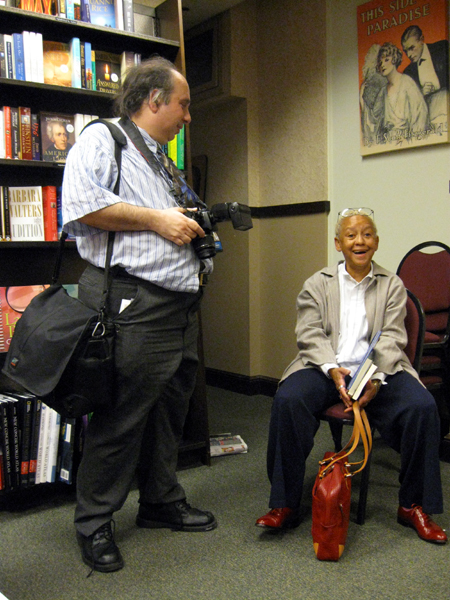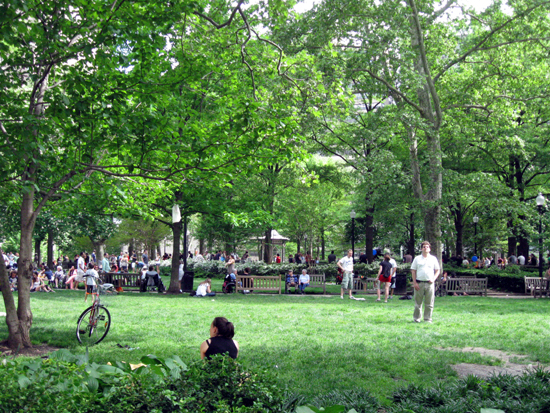Fortunately, I made it to the Barnes & Noble on time,
and someone at the front door told me if I was there for the reading,
I should purchase a book first at the cashier and then proceed to the
third floor.
When I arrived, the room was full. Nikki Giovanni was sitting on a
chair in the front of the room, chatting with some ladies about her
age in the front row, as well as to a photographer from the Philadelphia
Tribune (who told me later, when I saw him outside, that the story would
come out on Tuesday). She had on fabulous red dress shoes just a shade
darker than her equally fabulous red leather briefcase.
There was an extra seat in the front row, so I took it. Nikki and the
audience members were talking about an HBO show called The No. 1
Ladies' Detective Agency. They were having a pleasant conversation
when an older gentleman burst in, marched up to her and shook her hands.
He sat down in the front row, too, and interrupted the conversation
to interject somewhat disconnect thoughts. I began to wonder if he'd
do that through the entire reading, but perhaps because Nikki was polite
but subdued in her response to him, he eventually settled down.
When the book store staffer introduced her, Nikki took the podium and
launched into the story behind her latest collection, Bicycles. She'd
had a very rough time the year that she wrote it. Within a short period
of time, she lost a beloved dog, then lost her sister to breast cancer,
and lost an aging mother. To add to her grief, a murder took place in
her neighborhood, and then finally, as she called it, "the April
16th situation," the massacre of 32 students at Virginia Tech,
where she teaches. She had been in the news afterwards, because she
was one of the people who had noticed that the young man had mental
health problems and tried to warn her superiors at the university.
Understandably, this was a very difficult time for her, and she wondered,
"How do you make sense of the senseless?" For her, the answer
came in the form of finding love. She found herself wanting to write
love poems, and she turned every poem into a love poem. That's not to
say that she was ignoring the grief around her, but rather she chose
to see it as part of the cycle of life. She says that the image of wheels
or circles kept coming back to her, hence the name of the book.
Nikki gave plenty of interesting insights while she read. She's a very
quotable person. I'd like to share some of the things she said. While
telling the story of her sick dog, Wendy, she said, "I think everything
has intelligence." Then, while talking about her sister's diagnosis
of breast cancer, she suggested that men, who often touch the breasts
of the women they love, ought to learn what to look for, "So he
can get two things done at once." On facing her mother's death
and the comments she heard afterwards, she said, "Your mother dies,
it's never 'for the best'."
She said that she has "always defined myself as a voice."
She said, in particular, she's "always wanted to be an honest voice."
She has also seen herself as an acolyte and said that she would prefer
to be John the Baptist to Jesus, because, "You get to offer the
hope." Such thoughts lay behind the volume she wrote right after
her mother's death, Acolytes. She read the first poem from that
collection, which contained a lot of the details she had just told us.
I found it fascinating to put them into context.
Speaking about the Virginia Tech massacre, she said, "Thirty-two
people are dead, but it's not somebody's fault. The person responsible
was the murderer." She said she doesn't believe in revenge and
she also knows there is no way to get back that which was lost. "The
only thing to connect them is love. Find a way to love something,"
she said.
About love, she said that "love is a decision. A lot of people
think love is something that happens to you." Then she read the
first poem from "Bicycles," which was about finding solace
in a lover's arms.
As became evident from listening to her speak, Nikki is a lover of
life: with equal parts love for nature, food, and popular culture, always
with an eye for beauty. "I would rather not eat then have to eat
ugly food," she said. After discussing why she loves to watch Deal
or No Deal — because it's a show about "people being foolish"
— she read a poem she'd written in response to her class, who urged
her not to compete on the show because they don't want to see her making
a fool of herself. She wisely replied, in the poem, that "I know
you cannot go / Through life / Unless you are willing / For love or
money / To make a fool / Of yourself."
She finished with a fanciful list poem called "I Like," listing
things she likes. Throughout, the audience enjoyed her work, sometimes
interjecting praise, like they were in church.
I was struck, as I always am, by how natural-sounding her poems are.
They roll off the tongue like everyday speech, and yet they are carefully
crafted. She was very animated while she read, unlike many poets, who
take to the podium like a church elder reading a scripture verse. I
took a lot of pictures and got some which are really good, including
one that, while blurry, captures her natural response to the audience
laughing with her.
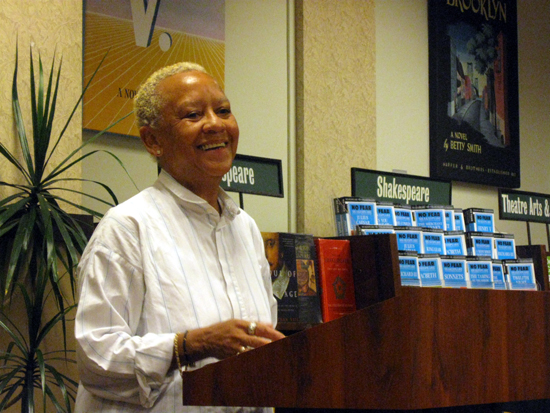
(Faster-loading
version)
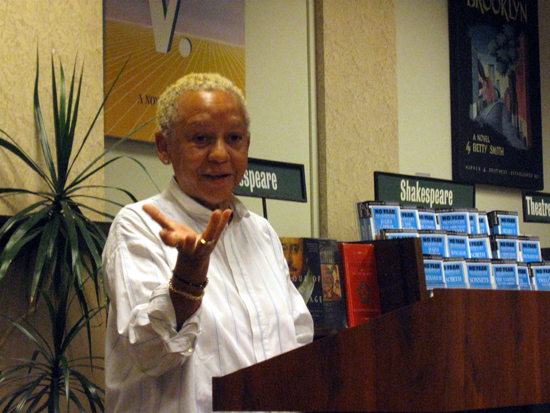
(Faster-loading
version)
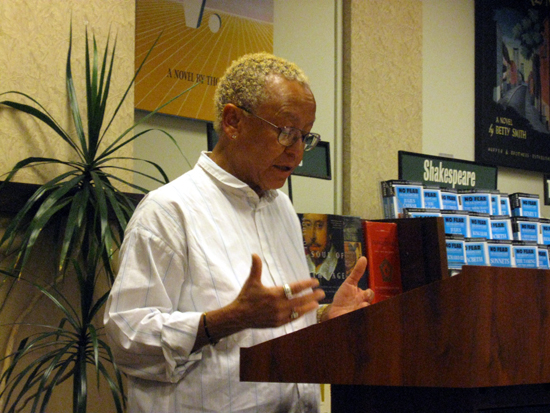
(Faster-loading
version)
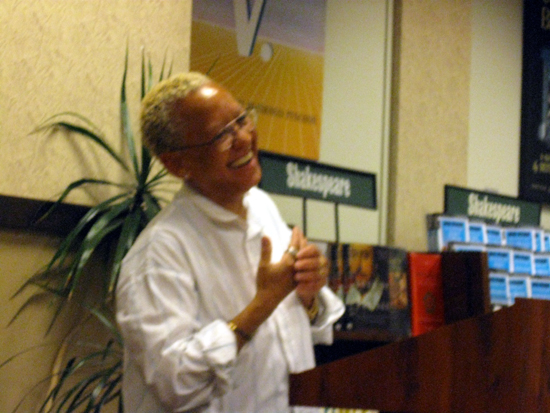
(Faster-loading
version)
During the Q&A session, I asked her about her use of pop culture
in poems and how it differs from writing about personal experience or
politics. First, she noted that politics is pop culture. And then she
said that she feels that "poets are like photographers, taking
a picture of the world in which we live." That's why she said she
incorporates pop culture; she wants to be current. Her goal, she said,
isn't to be read in 500 yeas. Shakespeare also tried to stay current,
she said, and joked that she thinks that puts her in pretty good company.
In response to other questions, she spoke about how, when she's teaching
writers, she says her job isn't to be critical so much as it is to give
them some of her time and help them to write the way they write, rather
than writing "for the teacher."
She spoke about one former student: Michael Vick, saying that she things
that fighting dogs is wrong but that so is horse racing and bull fighting.
Nikki finds electronic communications "fabulous and fascinating,"
while quickly adding that she hopes there will always be book stores.
She sees Kindle as making a difference in the textbook industry, and
that book stores should host more events, become more of a town hall,
since authors still need to come face to face with readers.
One of her pet peeves is the way that we are "allowing unsophisticated
people to control the dialogue, proclaiming her support for gay marriage.
After all, she said, "All marriage should be gay," (meaning
of course, happy). At this, one of the older women sitting next to me
sighed loudly and began reading a book!
She also spoke out about Bristol Palin, saying that the way she was
treated was abhorrent. Plus, "you look at Levi, you know it wasn't
even good sex!" She said that she felt that Bristol was made to
follow her mother's wishes for political expedience, when perhaps she
would have chosen another path if she wasn't being forced. Regardless,
she said, "We're supposed to be forgiving and loving. Our job as
grownups is to embrace."
When asked what inspires her, she said that "life is really interesting."
She added that, "As I stand here, I'm complete within myself. I
have discharged my responsibility." Now, she said, she feels free
to just enjoy life. "Life is about what you give; it isn't about
what you get. It's the giving that really brings the love."
Another audience member asked her, since she writes so often about
jazz, which is founded on improvisation, whether she ever does freeform
poetry. She responded, "My life is jazz; my poetry is classic."
She does, however, have great hope for the hip-hop generation and challenged
to "write an American opera."
Asked about the way that hip-hop language often denigrates women, she
said they aren't doing anything knew in Western culture. She seems no
need to indict them in stronger words than any of the blues artists
or country artists or rock stars who do the same thing. "I wish
they wouldn't [talk that way]," she said, "but I'm not going
to pretend they're inventing something, because they're not."
She also responded to praise of an album she had done that received
a Grammy nomination, which one audience member still finds inspirational.
"If you don't mind failing, then you can open doors, and other
people will come through," she said.
Afterwards, we all lined up to have our books signed.
When it was my turn, I handed her my Wild
Violet business card and asked her about the possibility of
doing an interview for an upcoming issue. She said she'd give it to
the person who handles such things for her and that we could set something
up for the Fall issue.
When I left, I was in really good spirits, so I decided to enjoy the
street fair. I hadn't had lunch, so I checked out the food booths. I
bought a delicious crab cake mini-sandwich from Butcher & Singer.
It was spicy and crisp with plenty of crab meat. Then I got a container
of fruit salad and a diet soda from the Marathon Grill booth. I ate
the fruit slowly in Rittenhouse Square Park, people watching. Lots of
people had dogs: especially pugs, Bichon Frises and terriers. People
of all ages stretched out in the grass or tossed around the mini-Frisbees
being distributed by a church. One man held his baby facing outwards
so she could see everything. The expression on her face was pure delight.
It was a beautiful, clear, warm spring day. I thought about how Nikki
said that love is the cure. The Spring Fair certainly seemed to demonstrated
that. I stopped briefly to listen to the Barry Warren Band. They had
the audience dancing along to a funky song.
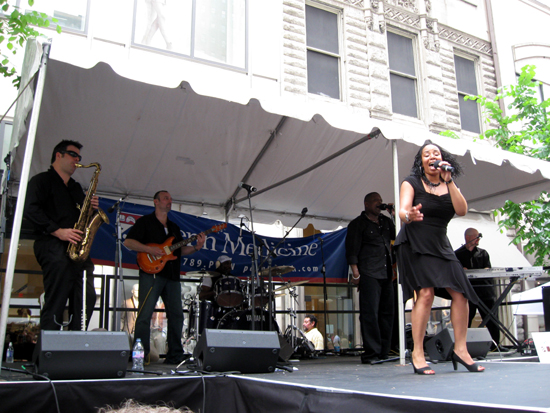
(Faster-loading
version)
I also got a great shot of a SEPTA worker trying to give balloons to
a fairgoer right as a burst of wind picked up.
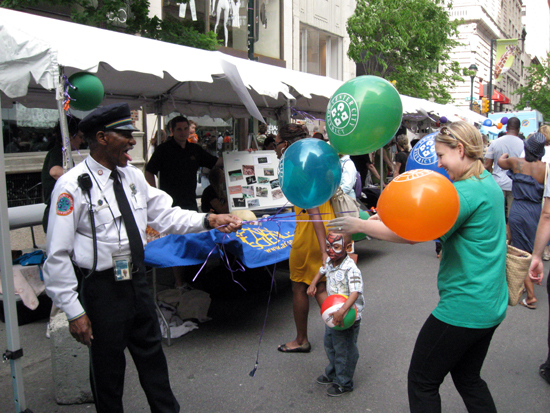
(Faster-loading
version)
By the time I got home, I was tired, so I took a brief nap and then
agreed to pick up The Gryphon. We drove to the Plymouth Meeting Mall
and bought tickets for the 8:30 showing of Star Trek, then walked
over to the restaurant area to eat. First we tried P.F. Chang's, but
they were really full. So we ate, instead, at the bar at Redstone Grill.
I wasn't terribly hungry, so I got the lobster bisque and a side salad,
with a glass of Stella Artois.
I know a lot of people love the new Star Trek, and I do think
director J.J. Abrams did a good job. It's not so much a prequel as it
is a revisiting or a re-imagining of the story. They'll probably make
more movies in this series, which may or may not connect to the original
canon. Obviously, this is a way for the filmmakers to free themselves
from the original story line, so that they wouldn't have to make sure
everything would connect perfectly.
Still, to play Spock (Zachary Quinto) as an angry young man, just barely
managing to keep his emotions together, initially seemed a bit off to
me. I understand they were trying to show how he became the man he was,
but it reminded me a little too much of the "rebel without a cause"
young Anakin Skywalker in the Star Wars prequels. In a world
that's increasingly violent and nonsensical, I resented seeing another
movie where violence is seen as a valid response to provocation.
Of course, by the end of the film, he does manage to learn something
and to become closer to the Spock we know. The movie also explores how
Kirk and Spock originally connected, since they're so different. That
exploration added dimension to the relationship, since it does seem
unlikely that someone like Spock would get along with a cocky, convention-flouting
guy like Kirk. This movie helps make sense of that relationship. And,
of course, Leonard Nimoy makes a cameo in a very important way. It's
great to see him again!
And I simply loved Karl Urban as Dr. Leonard "Bones" McCoy.
I thought he had the character down perfectly. It was fun to see McCoy
as a young guy, but still acting like a grumpy old man!
The visuals are stunning. Abrams even uses a glare on the lens in scenes
where there's a lot of light, such as the bridge. While I found these
blue or white lines to be a little distracting, it helped it seem less
like a set.
The costumes look like antecedents of the original TV series. Some
people have complained that Uhura's (Zoe Saldana) short skirt is impractical,
but if the director had changed it too much, purists would complain.
She does get more of a role in this movie than she had in the original
series. Some people may or may not like the path her character takes.
I just say, "Go, girl!"
Chris Pine, who plays Kirk does a great job of playing the character
his own way and yet imbuing it with recognizable traits and mannerisms
from William Shatner's portrayal of Kirk.
All in all, I felt the movie was enjoyable and well-done. They had
taken into consideration the feelings of Star Trek fans before
launching this revision. By telling this as an alternate reality, it
helps them to make changes without slighting the fans. I think this
slick, hip re-imagining will probably bring new fans to the Star
Trek universe.
